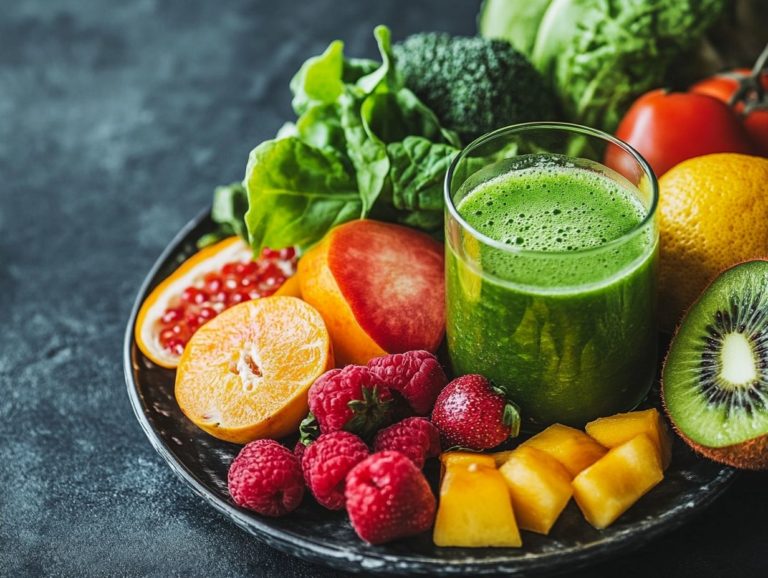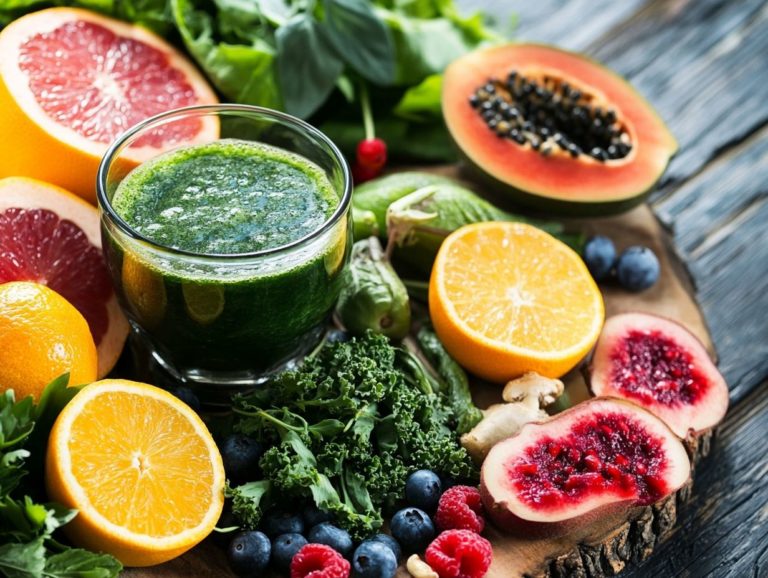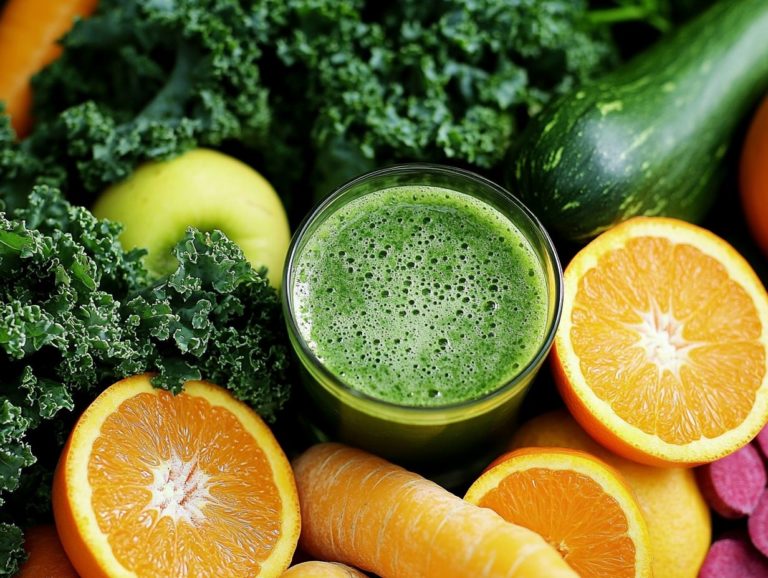The Importance of Fiber in Detoxification
Detoxification is a term that often prompts curiosity about the most effective ways to cleanse your body. One powerful yet frequently overlooked ally in this journey is fiber.
You ll discover how fiber plays a pivotal role in detoxification and explore the various types available. You will also find practical tips for boosting your fiber intake. Understanding how hydration enhances your detox efforts is crucial.
Get ready to discover the incredible secrets that can transform your health!
Contents
- Key Takeaways:
- The Role of Fiber in Detoxification
- Types of Fiber for Detoxification
- Benefits of a High-Fiber Diet
- How to Incorporate More Fiber into Your Diet
- Fiber and Water: A Powerful Detox Combination
- Frequently Asked Questions
- What is the role of fiber in detoxification?
- How does fiber aid in the elimination of toxins?
- What high-fiber foods help detoxify the body?
- Can fiber also help with weight loss during detoxification?
- How much fiber should I consume for optimal detoxification?
- Are there any potential side effects of consuming too much fiber during detoxification?
Key Takeaways:
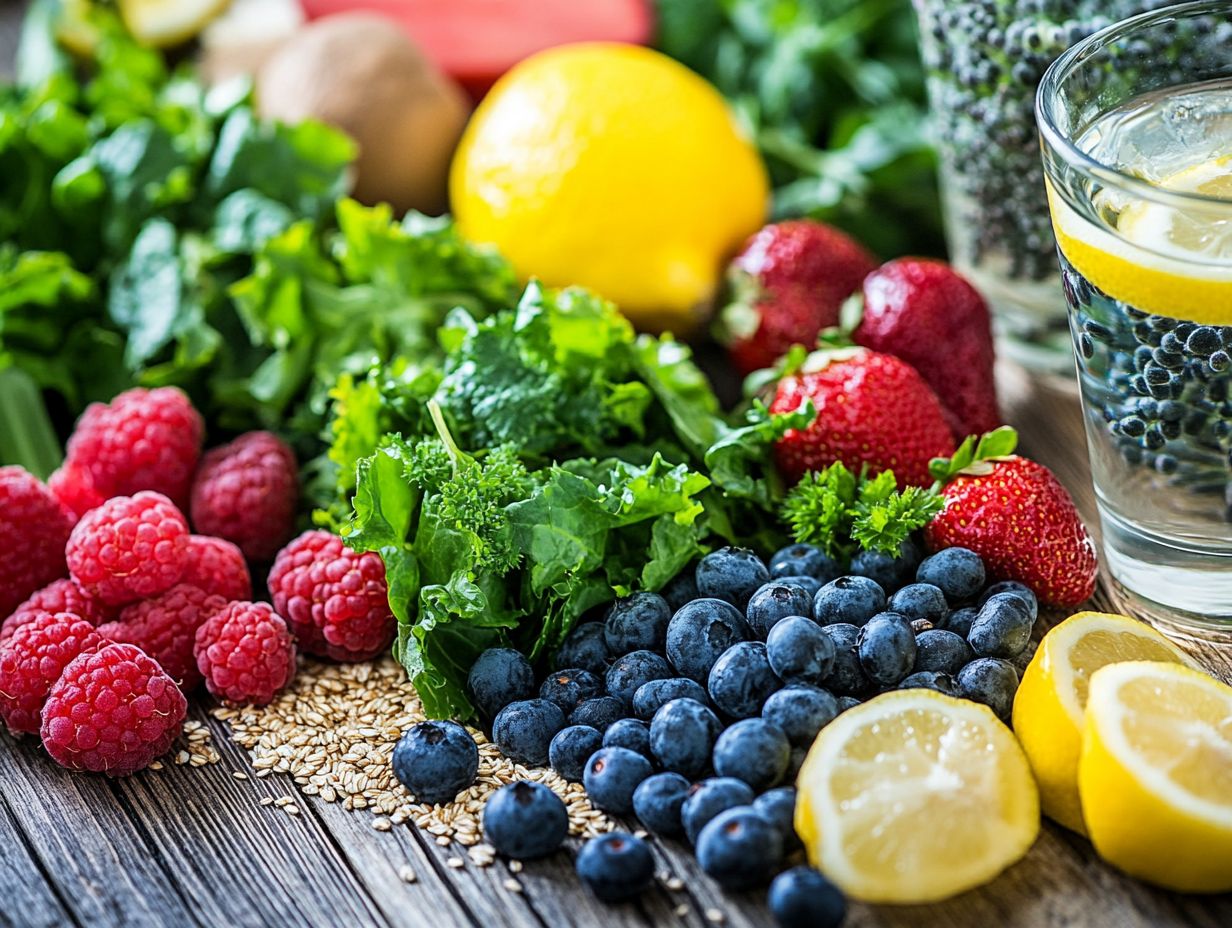
- Fiber plays a crucial role in the body’s natural detox process by aiding digestion and elimination of toxins.
- A diet high in fiber can reduce the risk of chronic diseases and improve overall health.
- Incorporating more fiber into your diet and staying hydrated work together as a powerful detox combination.
What is Detoxification?
Detoxification is a natural biological process your body undertakes to eliminate harmful substances or toxins, primarily through the liver and kidneys. This process is essential for maintaining your overall health and well-being.
It involves a complex system of mechanisms, including the production of substances that help remove toxins that neutralize and excrete these harmful agents. This ultimately supports optimal health and enhances bodily functions.
Your liver plays a pivotal role in this detox process, acting as the body s detox powerhouse. It metabolizes drugs and harmful chemicals, transforming them into less toxic forms. Meanwhile, your kidneys diligently filter excess salts and toxins from your bloodstream, expelling them through urine.
The detoxifying substances produced in your liver are crucial for facilitating these chemical transformations, ensuring that toxins are effectively processed and removed.
A well-functioning detox system not only protects your body from potential damage but also enhances your energy levels, boosts your immunity, and contributes to your overall vitality.
The Role of Fiber in Detoxification
Fiber plays an essential role in detoxification, supporting your digestive process and enhancing the elimination of toxins from your body. It nurtures your gut microbiome, aiding in the breakdown of food and the absorption of vital nutrients.
Its contribution to regular bowel movements and overall gut health paves the way for a multitude of health benefits that you can truly appreciate.
How Fiber Aids in Detoxification
Fiber enhances your gut health and aids the expulsion of toxins through regular bowel movements. This natural process is further supported by digestive enzymes that work hand-in-hand with dietary fiber to break down food and boost nutrient absorption.
By encouraging the growth of beneficial gut bacteria, fiber aids in digestion and maintains a balanced microbiome, which is essential for your overall health. These friendly bacteria flourish on fiber-rich foods and, in return, produce healthy fats produced by gut bacteria that help reduce inflammation and strengthen gut barrier function.
Fiber also binds to heavy metals and other harmful substances, facilitating their elimination from your body. The remarkable relationship between a high-fiber diet and digestive health highlights the necessity of incorporating a variety of fiber sources such as fruits, vegetables, and whole grains into your daily meals. Additionally, exploring the role of saunas in detoxification can further enhance your wellness journey.
Types of Fiber for Detoxification
There are two main types of dietary fiber soluble fiber and insoluble fiber each offering unique benefits for detoxification.
Soluble fiber, found in delights like oats and legumes, helps regulate your blood sugar levels and supports gut health. In contrast, insoluble fiber, present in whole grains and vegetables, promotes regular bowel movements and aids in the elimination of toxins.
Together, these two types of fiber play a crucial role in your overall health. Soluble fiber dissolves in water, forming a gel-like substance that can lower cholesterol levels and slow digestion. This contributes to a feeling of fullness that can assist in weight management.
You can enjoy foods such as fruits, barley, and psyllium as excellent sources of soluble fiber. Conversely, insoluble fiber adds bulk to your stool and speeds up its passage through the digestive tract, helping to prevent constipation. Foods like wheat bran, nuts, and broccoli are rich in insoluble fiber.
By incorporating both types into your balanced diet, you can enhance your digestive health, promote regularity, and support your body’s natural detoxification processes. Additionally, understanding the importance of ventilation in saunas can further contribute to your overall wellness.
Benefits of a High-Fiber Diet
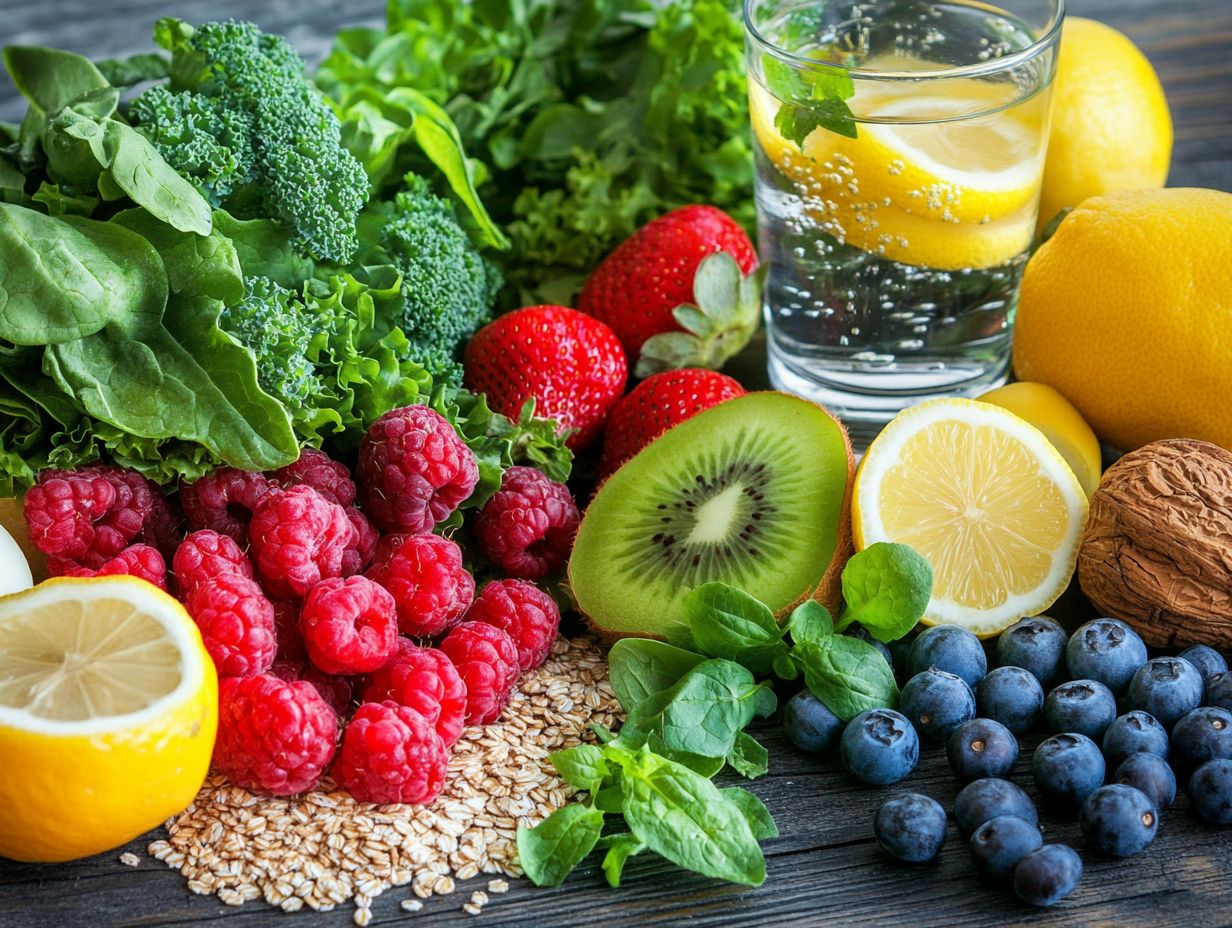
A high-fiber diet presents a wealth of health benefits that enhance your overall well-being. Get ready to enjoy improved digestion, relief from constipation, and a potential reduction of cholesterol levels each aspect contributes to a healthier lifestyle.
Dietary fiber helps regulate glucose levels, which enhances your metabolic health and strengthens your immune system.
Improved Digestion and Elimination
High-fiber foods can significantly enhance your digestion and promote regular bowel movements, offering effective relief from constipation. This improvement in your digestive process bolsters gut health, enabling your body to efficiently eliminate waste and toxins.
By incorporating a variety of fiber-rich foods think whole grains, legumes, fruits, and vegetables into your diet, you can experience a remarkable boost in your digestive health. Foods such as oats, lentils, apples, and broccoli are fantastic sources of both soluble and insoluble fiber.
This diverse intake not only supports regular elimination but also nurtures beneficial gut bacteria, reducing the likelihood of common digestive issues like bloating and irritable bowel syndrome. Ultimately, embracing a fiber-rich diet is vital for maintaining overall gut health, while also understanding the role of sleep in effective detoxification, ensuring that your body functions at its best.
Reduced Risk of Chronic Diseases
A high-fiber diet is your ally in reducing the risk of chronic diseases like heart disease and diabetes, thanks to its impressive cholesterol-lowering and glucose-regulating properties. This approach strengthens your immune system and significantly contributes to your overall health and well-being.
The benefits of dietary fiber extend well beyond these conditions; it’s crucial for gut health, enhancing the diversity of beneficial gut bacteria. By promoting regular bowel movements and reducing inflammation in the digestive tract, fiber intake plays a vital role in preventing colorectal cancer and improving metabolic health. Additionally, understanding the role of exercise in detoxification can further support overall wellness.
Foods rich in fiber, packed with antioxidants and essential nutrients, can help lower blood pressure and diminish the risk of stroke. Ultimately, embracing a fiber-rich diet not only tackles immediate health concerns but also paves the way for long-term wellness and resilience against chronic ailments.
How to Incorporate More Fiber into Your Diet
Incorporating more fiber into your diet is effortlessly attainable by embracing dietary recommendations that highlight the importance of nutritious, high-fiber foods like fruits, vegetables, whole grains, and legumes.
Don t wait explore fiber supplements to boost your intake today! If you find it challenging to meet your fiber requirements solely through food, consider exploring supplements as a viable alternative just be sure to consult with your healthcare provider for personalized advice.
For a quick takeaway, remember to add fiber-rich foods to every meal and snack, making it easier to reach your daily fiber goals!
Tips and Tricks for Increasing Fiber Intake
To boost your fiber intake, plan meals around high-fiber foods such as legumes, fruits, and whole grains. This ensures a balanced diet that promotes a healthier lifestyle.
Incorporate a variety of fiber-rich options to transform your health. Add beans and lentils to soups, salads, or stir-fries for a protein and fiber boost.
For snacks, choose fresh fruits like apples or pears over processed options. Opt for whole-grain snacks, such as popcorn or whole-wheat crackers.
Familiarize yourself with food labels. Look for products that have at least 3 grams of fiber per serving.
Increase your fiber intake gradually to avoid discomfort. This allows your digestive system to adjust smoothly.
Fiber and Water: A Powerful Detox Combination
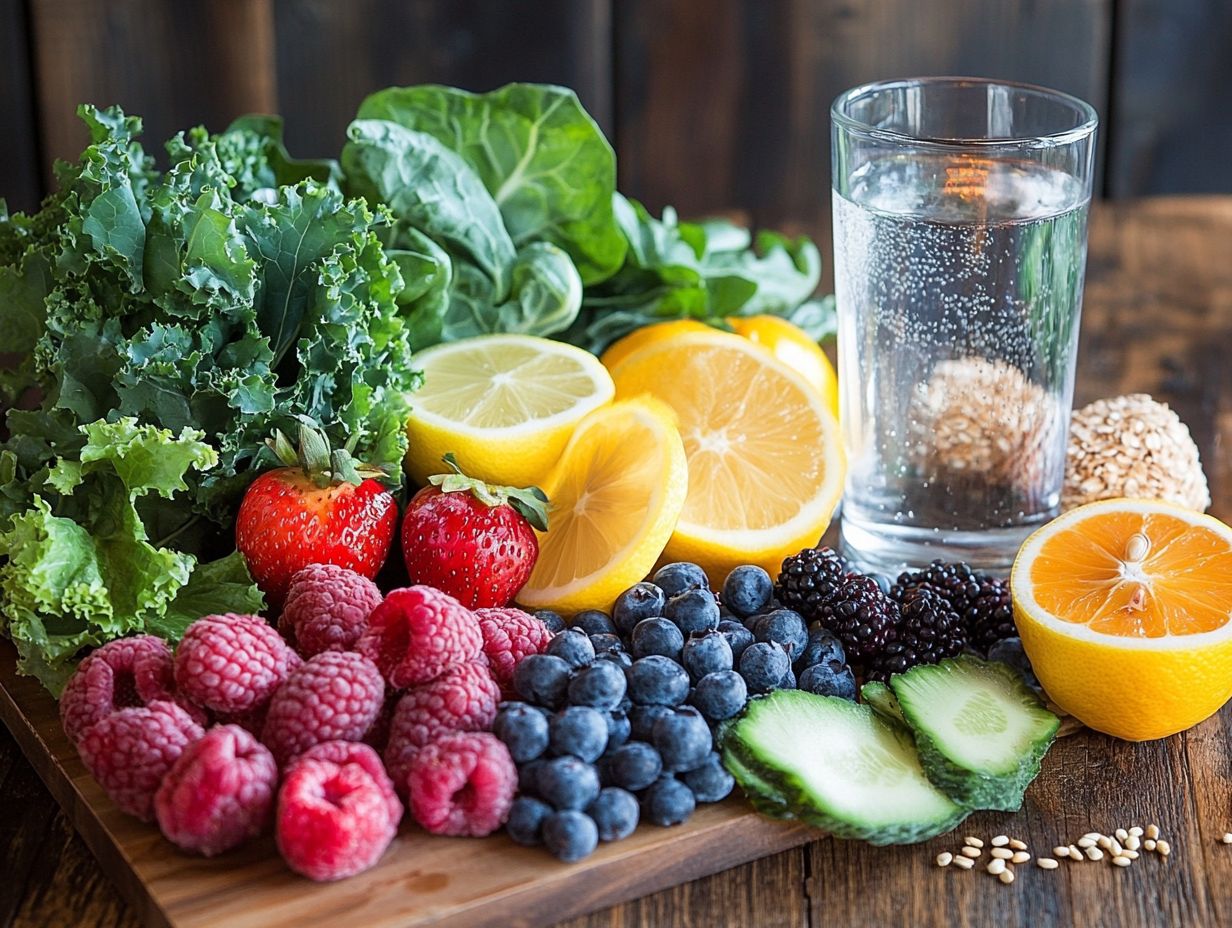
The combination of fiber and water is key for effective detox. Water helps absorb fiber and move waste through your system.
This powerful combination enhances gut health and increases the benefits of a fiber-rich diet.
The Importance of Hydration for Detoxification
Proper hydration is essential. Fiber and water work together for detox.
Fiber can help with weight loss by keeping you full, reducing cravings, and promoting elimination of waste.
Aim for a daily intake of 25-30 grams of fiber. During detox, consider consuming more fiber through foods high in prebiotic fiber or supplements.
Drinking plenty of water supports your digestive health, making sure everything runs smoothly. Stay hydrated to boost your body s natural detox mechanisms.
When well-hydrated, your body effectively flushes out toxins and promotes regular bowel movements. Fiber needs sufficient water to work properly.
Incorporate water-rich foods like cucumbers and oranges into your diet. Aim for at least eight glasses of water daily.
Remember, herbal teas and broths count towards your fluid intake, showing the connection between hydration and detox.
How Fiber and Water Work Together for Detoxification
Fiber and water work hand in hand for detoxification. Fiber enhances your digestive process, while water helps dissolve and transport toxins out of your body. Together, they create a formidable combination that amplifies the health benefits of dietary fiber and supports efficient waste elimination.
This dynamic duo is essential for fostering a healthy gut environment and maintaining a robust gut microbiome. For instance, soluble fiber, found in oats and legumes, absorbs water to form a gel-like substance. This slows digestion while binding to cholesterol and sugars, aiding in their excretion. Staying hydrated supports this process, and understanding the importance of hydration can help prevent constipation and promote regular bowel movements.
On the other hand, insoluble fiber, abundant in whole grains and vegetables, adds bulk to your stool, making it easier to pass through the intestines. When consumed together, these fibers effectively cleanse your digestive tract, reducing the risk of digestive disorders and enhancing your overall gut health.
Frequently Asked Questions
What is the role of fiber in detoxification?
Fiber is your body s best friend when it comes to detoxifying! It plays a crucial role by binding to toxins and waste products in the digestive tract to aid their elimination from the body.
How does fiber aid in the elimination of toxins?

Fiber acts as a bulking agent in the digestive tract, promoting bowel movements and preventing the reabsorption of toxins back into the body.
What high-fiber foods help detoxify the body?
High-fiber foods include fruits, vegetables, legumes, whole grains, and nuts and seeds.
Can fiber also help with weight loss during detoxification?
Yes, fiber can assist with weight loss during detoxification by keeping you feeling full and satisfied, reducing cravings for unhealthy foods, and promoting the elimination of excess waste and toxins from the body.
How much fiber should I consume for optimal detoxification?
The recommended daily intake of fiber for adults is 25-30 grams. However, during detoxification, it is advisable to consume even more fiber to support your body’s natural cleansing processes. Start with small amounts of fiber-rich foods and increase your intake gradually for the best results!
Are there any potential side effects of consuming too much fiber during detoxification?
Consuming too much fiber can cause digestive discomfort, such as bloating and gas, in some individuals. It is important to gradually increase your fiber intake and drink plenty of water to avoid these side effects.



